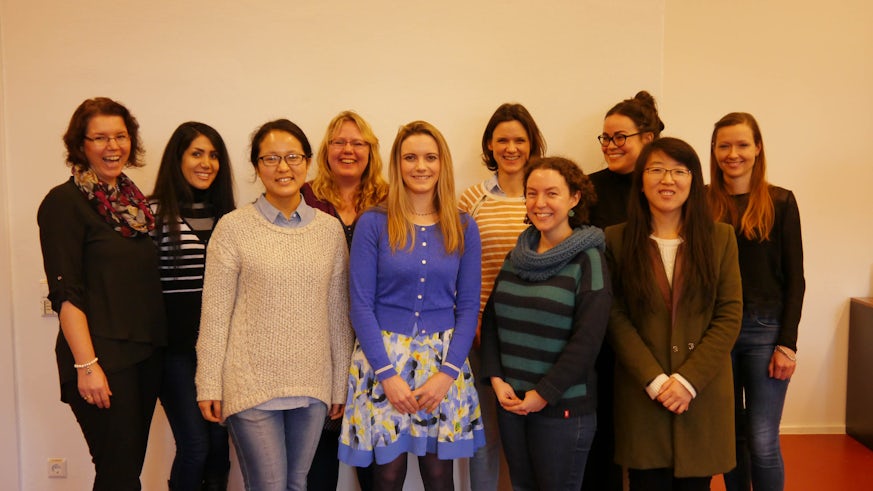Celebrating female role models in STEM
18 April 2016

Dr Rebecca Melen, a lecturer in Inorganic Chemistry at Cardiff University, is named as finalist in the Chwarae Teg 2016 Womeninspire Awards. Rebecca was nominated in the Pioneer category.
The Chwarae Teg Awards were set up to celebrate the contributions to society made by women across Wales. One of its ambitions is to inspire future generations of women to aim high and flourish in their professional and private lives, or in the wider community. The Pioneer Award is awarded to a woman who is a strong professional role model in STEM (Science, Technology, Engineering and Maths) subjects and who has used her experience and influence to encourage other women to consider a career in STEM.
Rebecca is an ideal role model for women in STEM. In her current role as lecturer in the School of Chemistry, she interacts with school children through open days, school visits and university interviews and take an active role in encouraging females with the academic talent to succeed in science-related disciplines to pursue those courses and careers. She is also a member of the Royal Society of Chemistry (RSC) Dalton Council which has an overview of the role women are playing in the sciences and can influence opinions within the professional sphere. Rebecca believes: “It is important to ensure that women are properly represented on these professional bodies and that their voices are heard. By taking an active role within the RSC I can help mould the medium-long term views of how to support women within Chemistry in particular.”
To date, Rebecca has gained a lot of experiences that are valuable to share with women wanting to break into the sciences. She chose to conduct the research for her Masters and PhD in a field she was passionate about but where there wasn’t much research activity going on at the time (main group chemistry). At the end of her PhD, she was given the opportunity to study at the Ruprecht-Karls-Universität in Heidelberg, Germany by her supervisor. Despite not speaking the language, the experience was eye-opening. She reflects that living in another country and seeing how chemistry was done there enabled her to grow personally and professionally: “I grew up a lot. I got to see how chemistry was done in another country. In the lab they all speak English, so that was fine. They tend to start a lot earlier – at 8am – in Germany, so initially I was the last person in the lab!”
After completing her PhD, Rebecca decided to take an even bigger leap and accepted a postdoc position at the University of Toronto in Canada. Moving to a different country and starting a new job, she admits, was a daunting experience: “I was quite apprehensive about doing a postdoc abroad and applying for jobs, but it’s a very good opportunity. You’re only away for one or two years for a postdoc – if you don’t like it, you can always come back.”
Since completing her PhD, Rebecca has won a number of awards and other accolades, such as winning the European Young Researcher Award in 2014 and being named as one of Scientific American magazine’s ‘30 scientists under 30’. She gives a lot of credit to supervisors and mentors who have supported her throughout her career and wants to pass this on to her own students. “Some students feel they’re not confident or good enough, but their supervisors should encourage them,” she says, “I try and act as a role model for undergraduate students to raise their aspirations so they can see it is possible for women to succeed in science and encourage them on to post-graduate work or into careers in industry.”
Rebecca was recently profiled by the RSC’s Chemistry World in a short film about her career and her transition from PhD student to lecturer and research group leader. To watch the full film, please visit the RSC Chemistry World website.